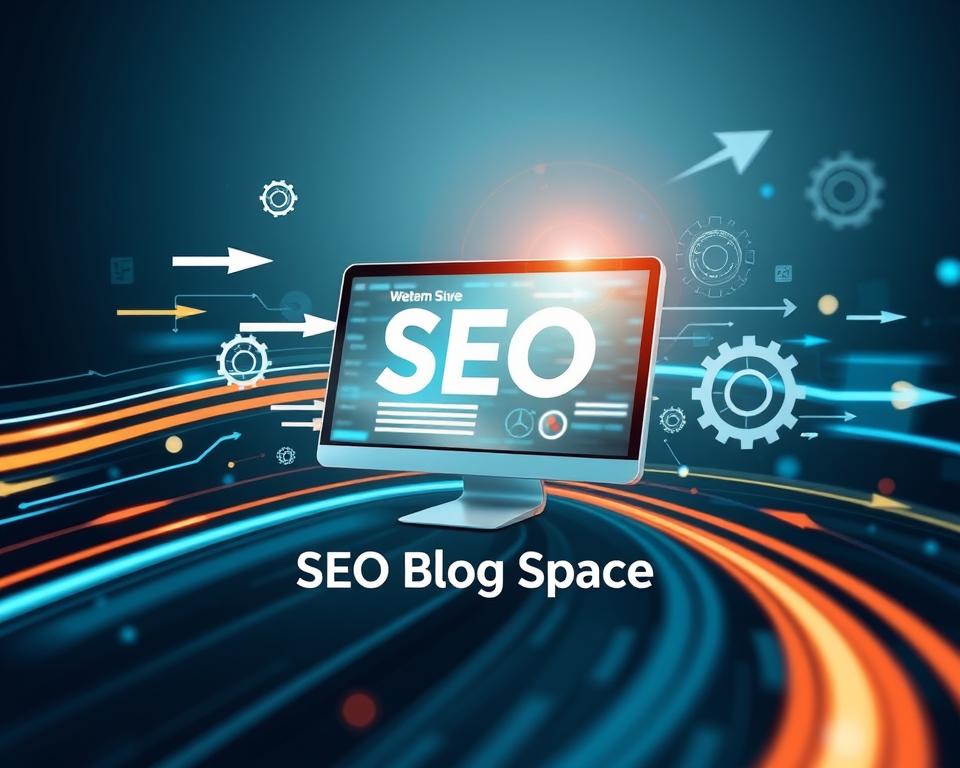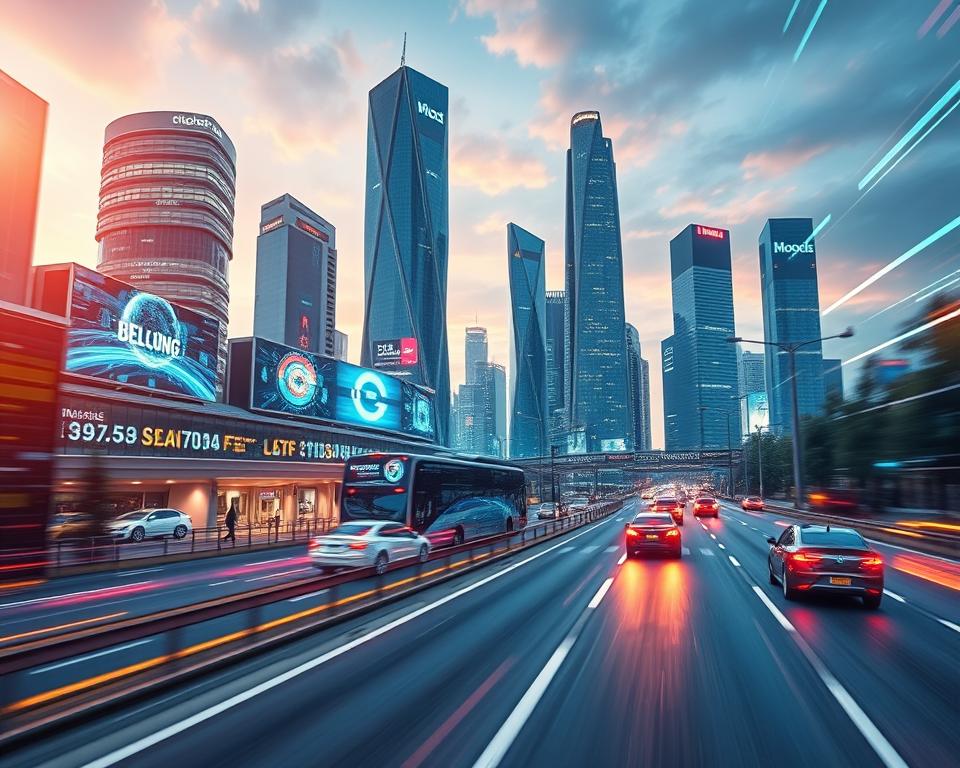Did you know over 90% of searchers don’t go past the first page of search results1? This fact shows how vital it is to make your website fast for SEO and user experience. In today’s world, where people’s attention is short, even a brief delay can affect your online success.
Google has known the value of page speed since 20101. About 40% of users will leave a website if it takes over 3 seconds to load1. Slow pages can lead to big problems, with bounce rates going up by up to 90% if users wait 5 seconds1.
Key Takeaways
- Website speed is a key factor for SEO and user experience
- Google uses page load time as a direct ranking signal
- Slow-loading pages can lead to higher bounce rates and lower conversions
- Improving your website’s performance can boost your search rankings and customer satisfaction
- Techniques like browser caching, image optimization, and using a CDN can make your website faster
Google Rankings and Website Speed
In today’s fast digital world, how fast your website loads is key to its visibility and ranking on Google2. Since 2010, Google has looked at page speed when deciding rankings. In 2018, they made it even more important by including mobile indexing2. So, how fast your site loads on mobile can really affect its search engine ranking.
Page Load Time as a Ranking Signal
Google now sees page speed as a factor for rankings since April 20232. They say users often leave a site if it takes more than three seconds to load3. This means slower sites might not rank well for certain keywords, losing out to faster ones.
Impact of Mobile Site Speed on Rankings
Google made page speed a key factor for mobile searches in July 20182. Having a super fast site isn’t always needed for good SEO, but being faster than others is key3. Things like server quality, caching, making images smaller, and efficient code can make your mobile site faster. This can help your site rank better and give users a better experience.
Understanding how website speed affects Google rankings lets you improve your online presence and give users a better experience3. Using techniques like caching, making images smaller, and simplifying code can keep you ahead. This ensures your site does well in search results.
| Metric | Impact on Rankings |
|---|---|
| Page Load Time | Websites with slower load times might not rank well for certain keywords3. |
| Mobile Site Speed | Google made page speed a key factor for mobile searches in July 20182. |
| Server Quality | Server quality affects website speed; consider a better hosting plan3. |
| Image Optimization | Big images can slow down your site and hurt rankings3. |
| Code Efficiency | Removing unnecessary code and simplifying scripts can speed up your site3. |
Working on making your website faster can boost your online visibility, user experience, and search rankings3. Keep an eye on your site’s speed and use best practices to stay competitive in SEO.
Website Speed User Experience
How fast your website loads is key to a good user experience. Studies show that 70% of customers won’t buy from slow websites4. Slow websites can make users feel as stressed as watching a scary movie4. But, fast websites keep visitors hooked and interested in what you offer.
Website speed is about how quickly a page loads in a browser. This includes server response time, content download speed, and how quickly the site responds4. Tools like Google PageSpeed Insights and GTmetrix give detailed reports on your site’s speed and performance4. Slow loading can happen due to big images, bad code, slow servers, embedded media, and not using caching4.
To make your site faster and better, focus on optimizing images and files, minifying code, using browser caching, and a Content Delivery Network (CDN)4. Also, improve server performance, use responsive design, and check your site’s speed often4. These steps help create a site that loads quickly and keeps visitors happy.
“A fast-loading website can lead to higher engagement, increased conversion rates, and improved visibility on search engines.”
Website speed matters a lot, not just for users5. Google uses page speed as a factor in rankings, especially with mobile-first indexing5. Sites that take more than three seconds to load are three times more likely to lose visitors5. Users are also more likely to leave if a page takes too long to load5.
Slow sites get less traffic because people don’t stick around or convert5. Now, mobile visits make up 58.67 percent of all website traffic, up from 31 percent in 20155. A slow site might stop users from buying, while fast sites make a good first impression and keep up with ads and recommendations5.
In short, making your website fast is key to a great user experience. By improving your site’s speed, you can boost engagement, conversions, and search engine visibility. Remember, users expect fast responses and get distracted quickly6. Aim for server response times under 200 ms for quicker page loading6. Use tools like Gzip compression and Content Delivery Networks (CDNs) to speed up your site6.
Website Speed Affects Conversions and Sales
Speeding up your website is key to boosting conversions and sales. Even a small delay in loading can hurt your profits. A 1-second delay can lead to a 7% drop in conversions7. Google suggests keeping your site under 2 seconds fast7.
In e-commerce, website speed is very important. A tiny 0.1-second faster load can increase conversions by 8.4% and average order value by 9.2%8. In travel, a 0.1-second quicker load can boost conversions by 10.1% and average order value by 1.9%8.
Website speed affects how users feel about your site. Fast load times mean users check out more pages, 60% more8. But, a 3-second load can make 50% of visitors leave, compared to just 2 seconds8.
Optimizing for Better Website Performance
To make your website fast and engaging, focus on performance. Use website caching, CDNs, optimize images, and minify code9. These steps can make your site faster and improve the user experience.
Website speed is crucial for conversions and sales. Focus on making your site fast to boost customer engagement and your profits.
| Metric | Impact of 0.1s Improvement in Load Time |
|---|---|
| eCommerce Conversions | 8.4% increase8 |
| eCommerce Average Order Value (AOV) | 9.2% increase8 |
| Travel Conversions | 10.1% increase8 |
| Travel Average Order Value (AOV) | 1.9% increase8 |
| Luxury Sector Conversions | 3.6% increase8 |
| Luxury Sector Add to Basket | 40.1% increase8 |
“A mere 0.1s improvement in load time can lead to a 10.1% increase in conversions in the travel industry, an 8.4% increase in eCommerce, and a 3.6% increase in the luxury sector.”8
Improving your website’s speed can greatly increase customer engagement and sales. Make optimizing your site a priority to stay ahead and offer a great online experience.
Optimising for Better Website Performance
To make your website faster and work better, you can try a few things. Using browser caching to save data can cut down load times10. Also, making images and videos smaller with tools like WebP can help a lot10. Choosing the right hosting and using a Content Delivery Network (CDN) can boost your site’s speed10.
Keep an eye on your website’s core web vitals and layout shift metrics to spot problems11. Using less CSS, JavaScript, and HTML, and speeding up server response can make a big difference11. By focusing on these tips, your website will be quick and smooth, which is key for SEO, making sales, and doing well overall12.
Since more than half of web traffic comes from mobiles12, making your site work well on mobile is crucial12. Using responsive design and fewer pop-ups or ads can make mobile users happy11. Keeping up with digital changes is vital to keep your site fast, easy to use, and visible to search engines11.
Source Links
- 5 Reasons Why Page Speed is Important for SEO Impact – https://cacpro.com/thinking/5-reasons-why-page-speed-is-important-for-seo-impact/
- Page Speed As A Google Ranking Factor: What You Need To Know – https://www.searchenginejournal.com/ranking-factors/page-speed/
- How Site Speed and Performance Affects Google Ranking – https://newlightdigital.com/blog/site-speed-and-user-experience/
- The Ultimate Guide to Maximizing Website Speed and User Experience – https://www.linkedin.com/pulse/ultimate-guide-maximizing-website-speed-user-experience-jyaac
- The Impact of Website Speed on User Experience and SEO — NLD – https://newlightdigital.com/blog/impact-of-website-speed/
- How page speed affects Web User Experience – https://uxplanet.org/how-page-speed-affects-web-user-experience-83b6d6b1d7d7
- How does site speed impact conversion rates & sales – Acclaim – https://acclaim.agency/blog/how-does-site-speed-impact-conversion-rates-sales
- How Page Speed Affects Your Conversion Rates – https://nitropack.io/blog/post/how-page-speed-affects-conversion
- 11 Website Page Load Time Statistics [+ How to Increase Conversion Rate] – https://blog.hubspot.com/marketing/page-load-time-conversion-rates
- 19 Website Speed Optimization Strategies for 2024 [New Data] – https://blog.hubspot.com/website/how-to-optimize-website-speed
- Optimizing Website Performance for Speed and User Experience – https://blog.blakeyeboah.com/optimizing-website-performance-for-speed-and-user-experience
- Welcome to the ultimate guide on optimizing website performance for an exceptional user experience! – https://medium.com/@sakshiinfoway/welcome-to-the-ultimate-guide-on-optimizing-website-performance-for-an-exceptional-user-experience-21c925efdf8d











